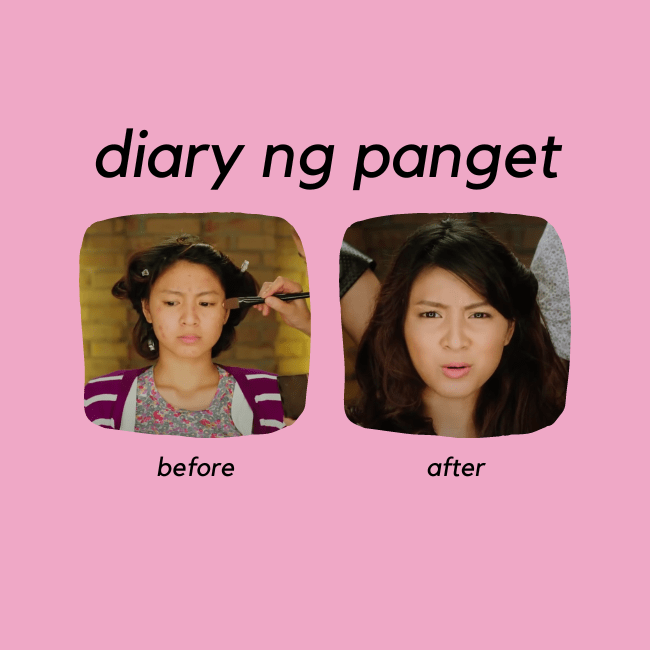Makeovers in movies perpetuate problematic beauty standards

I’m sure you would think of glamorous makeovers when you think of chick flicks. Recently, I have noticed how the ugly duckling trope propagates our favorite chick flicks. Normalized by the media, the big reveal is usually encapsulated after a two to three-minute makeover montage. The main character undergoes a full 180-degree transformation of their physical appearance, transitioning from an ugly duckling to a beautiful swan.
Makeover scenes in movies have long been rooted in femininity and heterosexuality. It just pleases a male audience and feeds fantasy to a female one. The beloved makeover trope has always produced a significant and unavoidable contradiction. Many of these film transformations follow the idea that these women could never be comfortable in their own skin because of society’s standards. It also follows the thought of women having to change their physical appearance to earn the attention of the man they like.
Makeovers in movies perpetuate problematic beauty standards
It is clear that the media fuels a toxic obsession with constantly improving appearance to achieve validation. The makeover montage glamorizes propaganda with protagonists having to change themselves to lead a happy life in the future. It’s also important to note that most of the time, what is portrayed as ugly in these movies isn’t even ugly at all.
Wearing glasses, having curly hair, and sporting thick eyebrows are not ugly. Even when they have several other traits that make them worthy of achievement and distinction in their career, viewers are led to believe that a full makeover is an absolute key to their success.
Makeover scenes build up the social construct wherein society created a mindset of what to expect from both men and women. This includes how they dress, how they behave, and how they should make decisions for themselves. Society expect women to look beautiful and it won’t even matter if she has intellectual skills in other areas.
Here are some of the most famous makeover scenes in Filipino movies:
Bakit Hindi Ka Crush Ng Crush Mo?
In every description of the movie (whether it be on Wikipedia or IMDB), Bakit Hindi Ka Crush ng Crush Mo? tells the story of Sandy Veloso, a brainy ugly duckling girl, and her journey as she turns into someone worth loving. Her boyfriend Edgardo breaks up with her and leaves her to ponder why she feels unwanted. To make matters worse, she got laid off by her company, under the leadership of its new bachelor CEO Alex Prieto. At one point, Alex offers Sandy a makeover so she will no longer cry over a failed relationship. Was she not worth loving because of her appearance?

Diary Ng Panget
Diary ng Panget literally means the diary of an ugly person aka the kind-hearted protagonist Eya. Orphaned at fourteen, she gets kicked out when she turned eighteen. She gets a new job as a personal maid for Cross. Although there is a makeover scene, it doesn’t really stick as her “ugliness” remain. However, the thing is — she isn’t really ugly. So, why even call it that?

The Gifted
The Gifted starts with storytelling about two “ugly” girls — overweight Zoe and unattractive Aica. They both remain highly gifted when it comes to their studies. When dumb and stereotypical Mark enrolls in the school, their friendship breaks as Zoe convinces him to pretend to fall in love with Aica.
Although he isn’t attracted to her, he forces himself to date her. Then, time passes by and they both undergo extensive plastic surgery for a makeover to become attractive. Zoe and Aica started a career in modeling and remain rivals. Plotting revenge ensues and the story continues.

At the end of the movie, however, it turns out that it was all a story of a book with Zoe and Aica who remained unattractive and overweight. Their names are actually Joey and Mica. The male lead or Marco has actually been envious of the girls’ successes and feels bitter for always placing third behind the two of them.
He expressed his anger throughout the novel. Two girls didn’t actually undergo any kind of plastic surgery to become more attractive. As mentioned, these kinds of makeover scenes only appeal to the male gaze and it was clearly shown at the end of the movie.

Must Be Love
Must Be Love revolves around Patricia aka Patchot who has always remained one of the boys. She started falling in love with her best friend, Ivan, who only sees her as a best friend. This problem develops when another girl, her cousin Angel, enters his life. When she undergoes the makeover, his view of her seemingly changes. Although the film had a good intention of making viewers see that we should appreciate a person for what they are, it still gives women a sense of insecurity by giving them the idea that being that beautiful can only be the reason for a man to like them back.

Although makeovers have become an iconic and distinct trope in many romantic comedies, they seem to slow down. Personally, I support these makeovers as long as they come from a place of self-love and knowing one’s self-worth.
Angela Grace P. Baltan has been writing professionally since 2017. She doesn’t hesitate to be opinionated in analyzing movies and television series. Aside from that, she has an affinity for writing anything under the sun. As a writer, she uses her articles to advocate for feminism, gender equality, the LGBTQIA+ community, and mental health among others.






